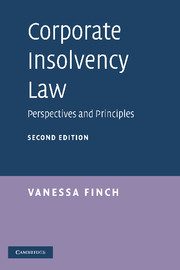Book contents
- Frontmatter
- Contents
- Acknowledgements
- Table of cases
- Table of statutes and other instruments
- List of abbreviations
- Introduction to the second edition
- PART I Agendas and objectives
- PART II The context of corporate insolvency law: financial and institutional
- PART III The quest for turnaround
- PART IV Gathering and distributing the assets
- PART V The impact of corporate insolvency
- 18 Conclusion
- Bibliography
- Index
Introduction to the second edition
Published online by Cambridge University Press: 05 June 2012
- Frontmatter
- Contents
- Acknowledgements
- Table of cases
- Table of statutes and other instruments
- List of abbreviations
- Introduction to the second edition
- PART I Agendas and objectives
- PART II The context of corporate insolvency law: financial and institutional
- PART III The quest for turnaround
- PART IV Gathering and distributing the assets
- PART V The impact of corporate insolvency
- 18 Conclusion
- Bibliography
- Index
Summary
This book sets out to offer a critical appraisal of modern corporate insolvency law rather than a description of existing statutory rules and case law on the subject. It will nevertheless attempt to set out rules and procedures of corporate insolvency law in sufficient detail to facilitate understanding of the framework and operation of this area of law.
A critical approach is seen as essential here on the grounds that it is impossible to evaluate areas of the law, suggest reforms or develop the law with a sense of purpose unless there is clarity concerning the objectives and values sought to be furthered, the feasibility of operating certain procedures and the efficiency with which given rules or processes can be applied on the ground.
Insolvency is an area of law of increasing importance not merely in its own right but because it impinges on a host of other sectors such as company, employment, tort, environmental, pension and banking law. It is essential, therefore, that the development of insolvency law proceeds with a sense of purpose. If this is lacking, this area of law is liable to be marked by inconsistencies of reasoning and failures of policy, with the result that related legal sectors will also be adversely affected.
The book's aims are threefold. The first is to outline the law on corporate insolvency (as at 31 May 2008) and the procedures and enforcement mechanisms used in giving effect to that law.
- Type
- Chapter
- Information
- Corporate Insolvency LawPerspectives and Principles, pp. 1 - 6Publisher: Cambridge University PressPrint publication year: 2009
- 1
- Cited by



